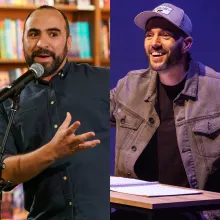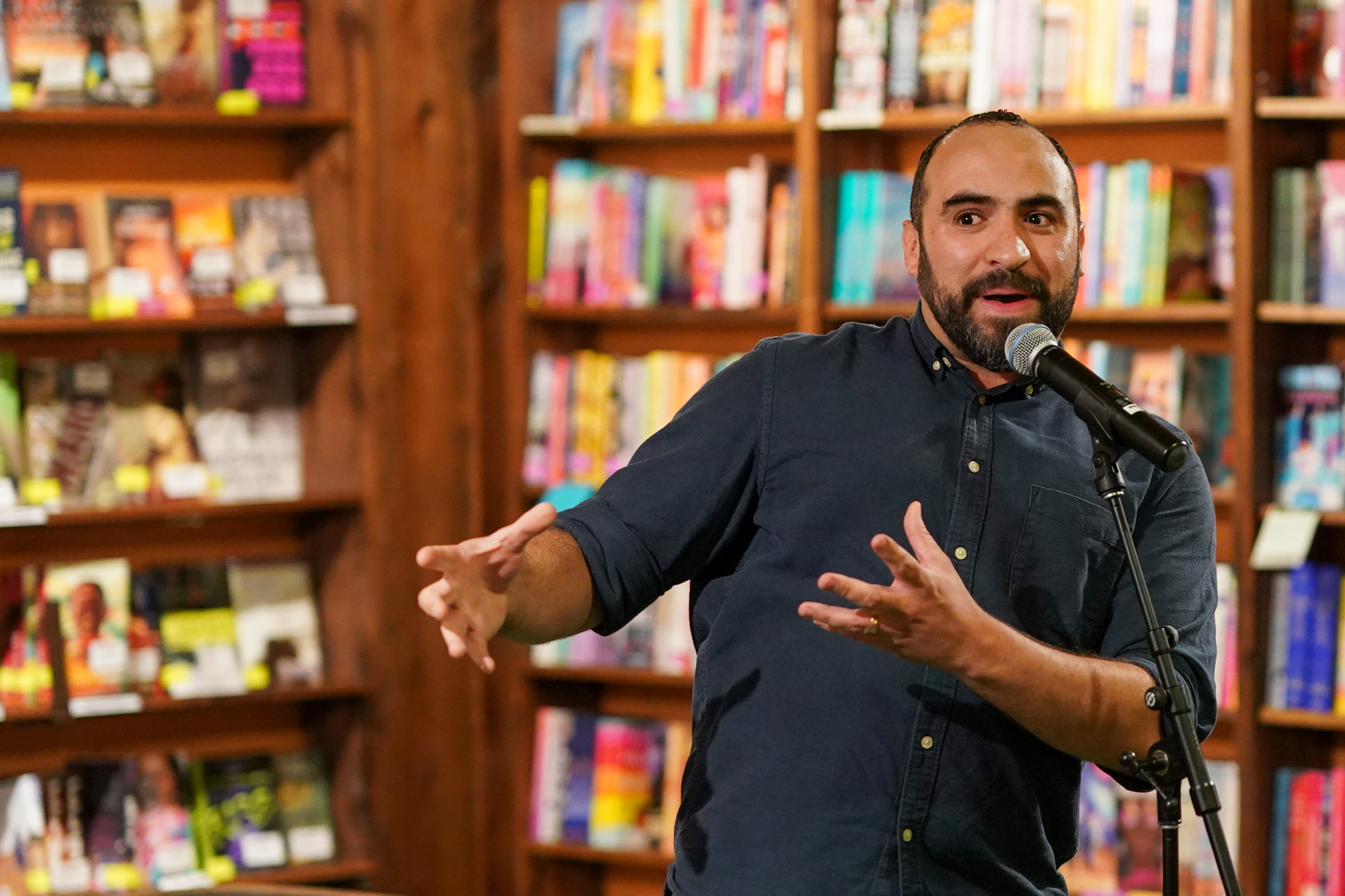
Meet the Stories of Change Workshop Facilitators: Luis Antonio Perez and Ryan Conarro
Luis Antonio Perez (Colorado Public Radio) and Ryan Conarro (Denver Prison Arts Initiative, Youth on Record) are facilitating our upcoming Stories of Change Workshop Series from January 20th-February 10th!
Youth ages 14-24 are invited to take center stage in this energizing, 4-session storytelling workshop designed to amplify their voices and ignite their creative spark. Learn more and apply by January 1st!
Q: Who are you?

Luis: I’m a storyteller, just like all of us are. When I usually answer this question I assume people want context about who I am, where I come from, and how did I get here. I was born and raised in inner-city Chicago in the 1990’s amidst an epidemic of gang violence, drug abuse, and the respite of Golden Era of Hip-Hop music. My mother is from Medellin, Colombia and my father is from a small town in Puerto Rico. I met my wife in high school but we didn’t get together until decades after we first met. I dropped out of college in my 20’s and eventually earned a B.A. and an M.S. in my 30’s. I’ve traveled Latin America a bit, I’ve made a few movies, I’ve worked in public radio and podcasting for more than 15 years. I pride myself on having the experience and know-how to understand what it takes to get a project done well, even though I rarely finish my own projects. What is most fulfilling to me in my work is helping others tell their stories. I’ve been teaching storytelling in one way or another for several years. These days, my purpose is to inspire people (including myself) to help each other by sharing empathy through stories.
Ryan: I’m a brother, a son, an uncle, a partner, a friend, a lover, a listener. I hope I am—I try to be—an engaged and contributing citizen of my neighborhood and my community. The twists and turns of life have led me to live in several different contexts over time, and I think that’s made me particularly love stories that connect us to the land - that awaken us to or remind us of the power of place. Where Youth on Record sits, for example — there are layers and layers of stories of people who’ve called this area home, who’ve been displaced, who’ve sought refuge here, who’ve loved and lost here. How can I, as a visitor and a relative newcomer here, contribute in some small way to collective healing through the power of making space for, and listening to, these stories?
Q: Is there a time when you first remember connecting with your storytelling talents?
Luis: Hard to say. The first time I remember thinking of myself as a storyteller could be when I would tell my friends about things that had happened to me – random but poignant things that I experienced in recent days—and they’d always say they really enjoyed listening to me tell stories. To me, I was just recounting the play-by-play of the day with some extra information, some context and maybe a little impersonation of someone or an adlib sound effect to help the story along. A friend said something that crystallized it for me. They said that in addition to the little performative bits I’d add to my stories, I was also taking time to describe how I was feeling as a character in the story all along the way, and doing it in vivid detail. So, as I talked about the different events and actions in my story, I was also describing what was happening in my mind and body. Now, as a more seasoned storyteller, I understand now how those details can be useful tools for building tension as a story unfolds. In the end, although I like sharing a good story I enjoy listening to stories even more.
Ryan: I’m actually not going to answer this question, and talk instead about a much more recent storytelling experience that was a big one for me. I’m gay, I used to live in New York, and I was married. My then-husband and I went through a sudden breakup that was really tough for me, and I decided to write a storytelling piece about it. It was called ‘Bad Husband//\\Bad Homo,’ and it was about trying to get through gay divorce and then navigate gay culture (whatever that is) as a single person again. Anyway, what’s important about this show is that it was a comedy. I tried to take all the stuff that was happening—heart-breaking, frightening, lonely - and invite a roomful of listeners to laugh at it all, with me. And, of course, what I learned is that in fact I was not alone. The profound lesson for me was just how cathartic and healing comedic storytelling can be.
Q: What do you hope to impart to the next generation of storytellers?
Luis: I say this at the beginning of any class or workshop… We are all experts at storytelling. We have been consuming stories our entire lives through TV, movies, even at family parties. The human mind is hardwired for narrative, therefore anyone and everyone can tell a story. Even when we spend money we are often buying into the story of that thing or buying into what the item adds to the story of ourselves. Every sporting contest is a story with an arc. A fight scene within a movie is a story. Stories are everywhere and we notice without noticing. Storytelling is a survival trait.
Ryan: I think my answer is what I just said about the power of telling stories. Storytelling can heal us, it can connect us. It’s a fundamental human impulse. I believe it can save us as a species. Take climate change, as an example. We can talk all day about how many degrees warmer the oceans are, and what percentage of coastal communities are currently under threat, and how big the hail is in Colorado as compared to last year. That’s important data… But, what is the best tool to change minds and hearts and laws and industry standards? Stories. The real stories of real people who are making change, and the stories of real people who so urgently need that change to happen.
Q: Why is storytelling urgent?
Luis: When isn’t storytelling urgent?! The stories we share are the glue of culture. Stories are how we draw meaning from the human experience. I’m convinced that the division we’re all experiencing around “controversial” subjects like vaccines, masks, and political affiliation etc. are more about the stories than anything. Stories of distrust in institutions that we all share in varying degrees. The story our positions signal to others about who we are. Even all the conspiracy theories and misinformation widely shared are often just really good stories. Storytelling is powerful. It can be used for good or for evil. I choose good
Ryan: I think we’re in a time when our sense of our citizenship—our sense of belonging in our communities big and small—is really shaky. Some of our most powerful communication tools, like AI and social media, are driving wedges between us even while making us imagine we’re connected. What is real and what is true is in question in new ways that I find scary at times. But one place where I feel safe and confident about reality and truth is when I’m listening to you tell me a story about experiences that you’ve lived. I think storytelling can be the key to us humans finding each other again.


